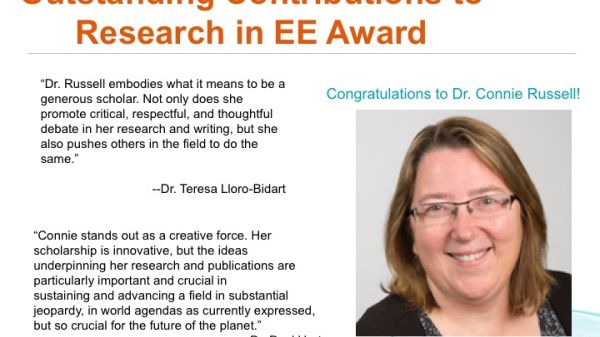Remarks from Connie Russell, recipient of the NAAEE 2017 Outstanding Contributions to Research Award

NAAEE 2017 Outstanding Contributions to Research Award: Remarks
October 17, 2017
Connie Russell
I am delighted and deeply honoured to receive this award. I want to thank the following folks who played one role or another in the nomination process: Justin Dillon, Bob Stevenson, Paul Hart, Jo Ferreira, Teresa Lloro-Bidart, Bob Coulter, Lex Scully, Annette Gough, Noel Gough, and Leesa Fawcett. I feel very fortunate to be part of such a supportive research community.
Alan also asked me to say a few additional words about my hopes for environmental education research in the next ten years, so will do so now.
As I said in the webinar [1], we need to continue to attend to whose voices and which perspectives, theoretical traditions, and methodological approaches continue to be marginalized in our field, why that is the case, and what we can do about it (Russell, 2016; Russell & Fawcett, 2013). There has been a significant blossoming in the past 20 years but there’s definitely much more room for growth.
Also as mentioned in the webinar, I am concerned about the neoliberalization of the academy and its impacts on the field (Hursh, Henderson, & Greenwood, 2015; Russell, 2016). This mirrors what is happening in our wider social contexts, of course, and makes very clear to me the importance of moving beyond the low-hanging fruit, to use a phrase Alan regularly uses (e.g., Reid & Scott, 2013, p. 520), and working to get at deeper, root problems underlying the environmental and social problems we are facing. It really is way past time to move beyond simplistic models of environmental learning that persist in our field. As I say to my students, if nature experience or experiences with other animals automatically disrupted anthropocentrism (Russell, 1999) or if knowledge really did magically lead to pro-environmental behavior (Kolmuss & Agyeman, 2002), if learning were really that simple, we wouldn’t be in the mess we are in now. So we need to continue to dig more deeply.
We also need to ensure that our research really does reach beyond our borders. Nicole and her colleague’s work on writing environmental education research briefs for a wider audience (e.g., Ardoin et al, 2015; EEWorks, n.d.) are good examples of just such an effort. We need to reach, and engage with, wider audiences. And obviously I don’t mean simply one-way communication here. We need to work with our partners, our communities, on the ground, to make a material difference in the world.
We also need to do a better job of reaching into other fields within education as well as with other disciplines. We need to reach out to kindred spirits both within and beyond the academy so that we can form coalitions and work together on projects of mutual importance as part of a politics of solidarity. That being said, doing so raises questions that I think warrant renewed consideration in the field such as the tension between education and advocacy or the idea of scholarship as activism (Ferreira, 2009; Jickling, 2003; Russell, 2006), which seems especially pertinent in these troubled times (Lowan-Trudeau & Niblett, 2017).
Now let me close by getting a bit morbid. I’m getting to the age where the death of family and friends is becoming a semi-regular occurrence, so perhaps it is not surprising that I am increasingly aware of my own mortality. The poet Mary Oliver (1992) asks a question I find myself continually returning to: “What is it you plan to do with your one wild and precious life?” (p. 94). Each of us has limited time on this planet so Oliver’s question demands that we ask of ourselves: What are we doing with our lives, including in our roles as researchers? Are we engaged in busy work? Are we conducting research that is not personally meaningful or that is unlikely to make a difference socially or environmentally because someone told us it would be a strategic move? Are we, in fact, devoted to selfish careerism? Are we fiddling while the world burns? So I ask you: What are your passions? What are your gifts? What privileges do you have that you can spend as an environmental education researcher? As a field, we have done tremendous work, but there is so much more left to do in ensuring that all of us - humans, other animals, the planet - can flourish.
Note
1. Much of the content for my remarks in the webinar were drawn from Russell (2016) which can be accessed for free here: https://cjee.lakeheadu.ca/article/view/1529/858
References
Ardoin, N., et al (2015). Environmental education research bulletin. Issue 10. Retrieved from http://www.changescale.org/wp-content/uploads/2017/09/EERB10_final.pdf
EEWorks (n.d.). The benefits of environmental education for K-12 students. Washington, DC: NAAEE. Retrieved from https://naaee.org/eepro/research/eeworks/student-outcomes
Ferreira, J. A. (2009). Unsettling orthodoxies: Education for the environment/for sustainability. Environmental Education Research, 15(5), 607-620.
Hursh, D., Henderson, J., & Greenwood, D. (2015). Environmental education in a neoliberal climate. Environmental Education Research, 21(3), 299-318.
Jickling, B. (2003). Environmental education and environmental advocacy: Revisited. Journal of Environmental Education, 34(2), 20-27.
Kollmuss, A., & Agyeman, J. (2002). Mind the gap: Why do people act environmentally and what are the barriers to pro-environmental behavior?. Environmental Education Research, 8(3), 239-260.
Lowan-Trudeau, G., & Niblett, B. (2017). Activism and environmental education. Canadian Journal of Environmental Education, 22, 5-10.
Oliver, M. (1992). The summer day. New and selected poems. Boston, MA: Beacon Press.
Reid, A., & Scott, W. (2013). Identifying needs in environmental education research. In R. Stevenson, M. Brody, J. Dillon, & A. Wals (Eds.), International handbook of research on environmental education (pp. 518-528). New York, NY: Routledge.
Russell, C. (1999). Problematizing nature experience in environmental education: The interrelationship of experience and story. Journal of Experiential Education, 22(3), 123-128, 137.
Russell, C. (2006). Working across and with methodological difference in environmental education research. Environmental Education Research, 12(3/4), 403-412.
Russell, C. (2016). Farewell editorial: On open access, the politics of citation, and generous scholarship. Canadian Journal of Environmental Education, 21, 5-12.
Russell, C., & Fawcett, L. (2013). Moving margins in environmental education. In R. Stevenson, M. Brody, J. Dillon, & A. Wals (Eds.), International handbook of research on environmental education (pp. 365-374). New York, NY: Routledge.
Connie Russell is Professor in the Faculty of Education, Lakehead University, Thunder Bay, Canada. Contact: crussell@lakeheadu.ca
Find out more about past winners and the research award on the eePRO blog
